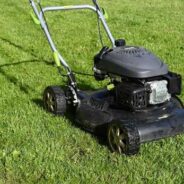Snapshots of Dementia: The Longest Yard
Photo by Andres Siimon on Unsplash I’ve had it!” my friend said. “I’m so tired of doing everything around here! She used to care so much about having a nice home. Now all she does is sit in front of the TV.” His words about his wife, who is living with dementia, reminded me of a time in our lives in 2015—more than four years before Tom was diagnosed. He seemed more tired every night than he had in the past, and I wondered if he was aging prematurely or perhaps just differently than I. And I really wondered about his obsession with simple computer games. In the evenings or on weekends, he would sit in front of his laptop for hours, not watching TV or engaging with me, just playing the same game over and over. In the meantime, I was either doing housework or working on a freelance assignment or walking the dog or. . . you get the picture. But what I didn’t do was lawn care. Our house in Florida didn’t have much of a yard; a pool and lanai (screened porch) took up most of the backyard. Mowing the grass didn’t take much time, but throughout our marriage, Tom had never wanted me to take on that chore anyway. And since I’m allergic to almost every kind of grass, I never minded. Over the past year or so, he had done less and less with our yard. But suddenly, he wasn’t taking care of the lawn at all. We had no children left at home, so we couldn’t assign this chore to one of them. The grass that had almost taken over some of the beds around the lanai was growing again, and I just couldn’t take on this job too. So—long before I took charge of our finances and every other aspect of our lives—I contacted a friend who has a lawn business. He and his team quickly got our yard back into shape, all while Tom and I were out of town, then continued servicing the lawn every week. What should have seemed strange was that Tom never objected to nor seemed grateful for this plan. In the past, paying someone for something he could do would not have been his idea of a wise expenditure. But he never said a word. In fact, only a few months after I hired the lawn service, Tom sold our lawnmower for a ridiculously low price to a neighbor who needed one. I was amazed. Was he planning never to mow the lawn again? Now that I know that he was at least on his way toward LWD, I know he didn’t have a plan at all. His day job was consuming most of his energy, and he couldn’t organize his free time enough to include regular chores. Back when I was wondering if Tom had dementia, I never thought to look up his lack of interest in household chores as a sign or symptom. I wish I had, because I see descriptions such as “loss of initiative” or “difficulty performing familiar tasks” on lists like this. But back when I first noticed Tom’s disinterest in lawn care, dementia hadn’t yet hit my radar. In fact, as I checked to see when I first hired...
read moreSnapshots of Dementia: Time Out
(Unsplash) She nailed it. My friend, whom I can always count on to call ’em as she sees ’em, read between the lines when I wrote about my foolish assumption that I wouldn’t need an alarm on my freezer. In case you missed that post, I learned the hard way that an alarm is an excellent idea when your loved one is living with dementia. What my friend noticed, in her usual insightful way, was not so much the cost of the food we lost—although that was significant. Instead, she pointed out the time I lost: — Time spent checking all the food (some of which remained frozen, much of which did not). — Time spent throwing out the spoiled items. — Time spent mopping the floor. — Time spent scraping, wiping, and otherwise cleaning up the freezer. — Time spent shopping to replace the spoiled food. — Time spent working late to make up for the time I spent doing those all those other things. Dementia has many hidden costs—$321 billion a year in the U.S. per a 2022 analysis. But without a doubt, one of the greatest is time—for the family or whomever is caring for the person LWD. As the disease progresses, the time spent on the person LWD only grows. I feel blessed to have a profession in which I can, for the most part, set my own hours. When I first began working from home, one of my jobs required a regular schedule with half-hour or every-hour deadlines. I had to start by 8:30 a.m. at the latest and often worked straight through for many hours with only the smallest of breaks to check on Tom. Over the past year and a half, God has allowed me to make some major adaptations in that schedule, and although at times I need to write or edit a piece within a few hours, I generally have a much larger window of time. That’s huge because although Tom can still do some things for himself, my time-costs have risen in the following areas: LEAVING THE HOUSE: This aspect of our LWD life reminds me of when our kids were small and I had to allow extra time because invariably, a last-minute emergency would delay us. Our LWD last-minute emergencies include bathroom visits, retrieving forgotten items, closing doors left open, him refusing to leave until he finishes a game on his iPad, and more. INTERRUPTIONS: This time-cost has increased significantly in the last six months. I have rarely asked Tom not to interrupt me while I work (and if I did, he wouldn’t remember). So when he misplaces his reading glasses, his Chapstick, his remote control, or something else, he asks for help—often several times a day. When he can’t solve one of his word games, he asks for help—often several times an hour. SPILLS: I mentioned in my last post that these have become more frequent. At least once or twice a week, I clean up spills on the floor or elsewhere, all related to Tom’s dementia. This week, I removed, washed, and dried everything in our silverware drawer (including the liner) after he spilled coffee grounds throughout. Bonus: I made a small start on my spring cleaning! DOCTOR’S APPOINTMENTS: Multiple physical problems have...
read moreSnapshots of Dementia: Ch-ch-ch-ch-Changes
(Photo by USG on Unsplash) I have discovered that I am not the only dementia caregiver who doesn’t love the question, “How is ___________(person living with dementia)?” The reason we don’t love it is not because we don’t appreciate the interest. I love having people show concern for Tom. My caregiver friends and I have trouble with this question because of only one thing: There’s no quick-and-easy way to answer it—and the person who asks rarely has time for or interest in the long answer. I generally respond with something like, “He’s doing as well as he can, but the disease is progressing.” That is true, of course. But what is also true is that behind each of these changes lies one more piece of my broken heart in which I realize that what goes away never returns. When I first told the world via Facebook about Tom’s dementia, I called it a thief. I still think that’s one of the most accurate descriptors for this enemy that has taken so much from Tom and from our family. Here are some of the ways it has stolen from us in recent days—in other words, the behind-the-scenes changes when I say he’s doing “as well as he can.” GROSS MOTOR SKILLS: He stumbles more nowadays when he walks and has had lots of near-falls. Using the walker for his back/leg problems has helped keep him more stable. But using a walker when you are LWD can be a challenge because you forget to grab it when you get up—and sometimes forget that you use it all. FINE MOTOR SKILLS: Tom’s handwriting, never great, has gotten worse, although he can still sign his name when needed. He can still feed himself, but he is getting more and more clumsy, often spilling his coffee or knocking something onto the floor. The tremors in his hands don’t seem to have worsened, but the spilling has definitely increased. SPEECH: He still talks, but he sometimes forgets what he intended to say and frequently struggles with how to express it. A conversation with him includes many pauses and sighs. When he does connect his thoughts, he can contribute, but what he says may contain gaps in logic or reality. However, he can still insert a joke or wry comment with surprisingly on-point comedic timing. In a social situation such as a crowded restaurant, he usually shuts down; too much stimulation seems to overwhelm his thinking. MEMORY: This is one area that keeps changing, but the changes don’t always make sense. He can still (usually) prepare his own coffee, but sometimes he forgets what he is doing while making it, and later, I find his open mug and creamer on the counter. At other times, he remembers a scheduled event or something someone said that I didn’t expect him to recall. It’s as though his brain is a sieve, and I never know which thoughts it will catch. PERSONAL CARE: He can still take his own shower, shave, brush his teeth, and so forth, but I have to remind him about all of these, and he doesn’t handle them as well as in the past. We have grab bars in our shower, and he has used these on occasion to keep from falling. He shaves only about every three...
read moreSnapshots of Dementia: A Person’s a Person
(Facebook/Horton Hears a Who) You remember the Dr. Seuss story. Horton the Elephant becomes the champion of Whoville, going to extreme lengths to save its citizens from threatened destruction by his jungle pals. The theme that resonates throughout arrives in Horton’s oft-repeated line, “A person’s a person, no matter how small.” We’d all agree. Or would we? I used to complain—or at least wonder—about people who seemed unaware of those around them: How can they not pay attention to anyone except themselves? You’ve seen people like this. It’s the woman so focused on the groceries she needs that she doesn’t realize her cart is blocking the aisle. It’s the man who talks loudly on his cell phone, oblivious to the fact that he’s disturbing everyone around him in the otherwise-quiet waiting room. It’s the woman next to you at the beauty salon who launches into a long story as if you were her best friend, eager to hear all the not-so-interesting details. It’s someone living with dementia. Or at the very least, it could be. Tom, my person LWD, has trouble focusing on more than one thing at a time. He doesn’t push a grocery cart for me anymore, but when he did, he would often cut across someone’s path without realizing they were there. I intercepted several angry looks and gestures while he remained oblivious. He rarely uses his cell phone now, but when he did, he tended to speak loudly, and his conversations were often circular in nature. Since he couldn’t follow directions well, whatever was explained to him had to be repeated more than once, often without good resolution. And his stories? Most people who have even a passing acquaintance with him has heard at least one of his stories—often multiple times. Today, we visited a medical specialist’s office. It was our second visit, and although the doctor was treating Tom for a medical problem, he of course knew he is LWD. At first, the doctor spoke kindly to him. He even repeated himself without flinching when Tom asked about the same thing he had explained less than two minutes earlier. But the more time they spent together, the less patience this doctor seemed to have. By the end of the appointment, as Tom tried to finish a (surprisingly brief) story, he interrupted him, gave me some final instructions, and walked out of the room as if Tom weren’t even present. I know doctors are busy, and I know this one had other patients waiting. And Tom? He didn’t seem to notice anything had changed. He blinked, turned his attention to me, and promptly forgot what had happened. But I knew. And I won’t forget. At my next opportunity, I’ll speak a few words to the doctor about the respect I feel a person LWD deserves. I’ll do so because: • A person’s a person, no matter how small their IQ. • A person’s a person, no matter how short their memory. • A person’s a person, no matter how many times they ask you the same question. • A person’s a person, no matter how rude. • A person’s a person, no matter how confused. • A person’s a person, no matter how much extra time they take. When we meet...
read moreSnapshots of Dementia: Scam Alert, Part 2
James Wheeler/Unsplash “What I would really like—is to have my Facebook back.” It took Tom a much longer time to get those words out than it used to. But when he said it a few months ago, my answer didn’t change. I’ve heard this request a few times since, at the request of our marriage counselors, he closed his Facebook account in 2018. I am far from a control freak. And the reason I will never say yes to this request is not so much because I’m worried about what he might post—if he could—but because that’s how the scammers initially found him. Like many of us, Tom loved connecting with friends on Facebook. And eventually, scammers loved connecting with him too. I’m not sure how they initially found him, and doubt I want to know. But I do know that those villains I’ve learned are called “catfishers” got him, and through Facebook and email, they hooked him. All through one summer and part of the fall, he was giving away money in the ways I mentioned in my last post. When I opened separate bank accounts, I wasn’t trying to keep him from our money but to protect it. Raising five children on a pastor’s salary plus my varying freelance income, we’d never had a lot extra. I had intended to use my now-regular income as savings for retirement. Instead, I had to pay off his huge credit card bills—and pay back our children’s college trust. That fall, our marriage counselors asked Tom for an accounting of how much he had given away. I’m not sure he remembered it all. But with what he could account for, the total came to nearly $30,000. Had I not found that final uncashed check, it would have been at least $10,000 more. Because the doctors still kept telling us he was fine, neither our counselors nor I associated his behavior with dementia. Serious problems, yes. Dementia—no one else seemed to think so, so why should I? At least four times, Tom fell for scams as believable as the emails we’ve all gotten from the wealthy prince in Nigeria. Despite his interest in other women, his primary motivation was helping others. Even when, through counseling, I gained the strength to insist he stop contacting the catfishers or move out, he at first insisted he needed to keep his one remaining contact. After all, she was stuck in another country with no way to get home, and “she promised to pay me back.” The few times I’ve shared even part of this story, people ask if we ever recouped our money. Not. A. Penny. Tom went to the police early on to complain about being blackmailed, and whatever they said convinced him there was nothing we could do. I don’t think he even realized the others were also scammers. Since I knew he had willingly given up the funds and, at the time, didn’t know he had dementia, I never considered seeking legal help. It was all I could to hold my life, my job, and my marriage together; I didn’t have time or energy for much else. And I didn’t know there was an National Elder Fraud Hotline for schemes just like what we experienced. Despite the financial losses, I can say without a doubt that gains came too. The counseling...
read more







